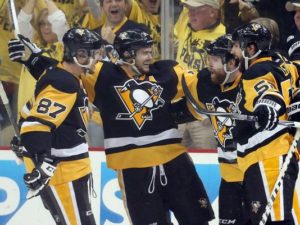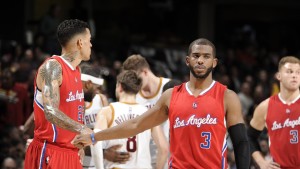
The Houston Rockets have been the NBA’s hottest team through the first two months of the season and currently hold a Western Conference-leading 25-5 record. Until last night’s loss to the Lakers, one in which MVP candidate James Harden casually dropped 51 points, the team had won 14 games in a row and had also gone 15-0 with point guard Chris Paul in the starting lineup. Paul, though, left last night’s game with an adductor strain and is currently considered day-to-day.
Now that we enjoyed that little bit of fun, it’s time to return to reality and consider whether or not the Rockets can seriously stack up with the Warriors if the two meet in the playoffs.
Much of Houston’s success to this point in the season has been due to the acquisition of Paul from the Clippers this past summer. While Harden has been one of the league’s best players this season, the Rockets are a different monster with CP3 on the floor. To show you just how good Paul has been in just 16 games this season, I give you this table from the good people at Basketball-Reference that provides point differentials and field goal percentages of the Rockets’ lineup combinations to this point in the season. I have modified the table to remove the most common five-man lineups that feature Harden. The point differential, per 100 possessions, of some of these combinations may shock you:
| Net | Net | Net | Net | ||
|---|---|---|---|---|---|
| Lineup | MP | FG% | 3P% | eFG% | PTS |
| R. Anderson | T. Ariza | E. Gordon | C. Paul | P. Tucker | 17:18 | -.059 | -.071 | -.012 | +12.1 |
| R. Anderson | T. Ariza | C. Capela | E. Gordon | C. Paul | 16:43 | +.208 | +.292 | +.279 | +29.9 |
| R. Anderson | T. Ariza | E. Gordon | N. Hilario | C. Paul | 13:44 | +.167 | +.389 | +.326 | +49.8 |
| R. Anderson | E. Gordon | N. Hilario | C. Paul | P. Tucker | 13:26 | -.035 | +.063 | +.019 | +16.1 |
| E. Gordon | N. Hilario | L. Mbah a Moute | C. Paul | P. Tucker | 12:51 | +.257 | +.083 | +.300 | +59.4 |
| Player Average | 471:37 | +.044 | +.071 | +.094 | +18.1 |
Holy hell, Batman.
In reality, though, this shouldn’t be that much of a surprise. Paul has been a plus/minus god for the better part of ten years and is, for my money, one of the three best point guards in the game today. That makes his injury last night, the second significant one he has suffered this season, all the more concerning. While he isn’t expected to miss much time at the moment, the Rockets cannot possibly win a championship without him. After all, we’ve seen what can happen to the Rockets in the playoffs without him and it wasn’t pretty.
All that being said, this is not at all an affront to James Harden’s abilities. It is, however, a testament to the state of the NBA today that having just one of the best players in the league is not nearly enough to get a team into serious championship contention. The other problem for the Rockets last season was that Harden, without the presence of a true point guard, played the position admirably and nearly won Most Valuable Player honors. The issue was that, by the time the Rockets faced off against the Spurs in the Western Conference semifinals, Harden was asked to create his own offense and initiate most of Houston’s, as well. He barely shot over 41% in the series and the Rockets were dispatched despite the Spurs’ loss of star forward Kawhi Leonard at the end of Game 5. The Rockets don’t have that problem anymore, and while Harden can put the team on his back for periods when Paul is injured or on the bench, the team hopes that they won’t completely need him to come playoff time.
Since we seem to keep coming back to it, let’s address this next issue head-on. Can the Rockets dethrone the defending champions and beat the Warriors in a playoff series?
For starters, let’s take a slightly closer look at the performance of both teams to this point in the season. The Dubs are currently just a half-game back of Houston for the top spot in the West, and while much of the attention has gone to the Rockets’ start, the Warriors have ripped off 25 wins in their first 31 games with little to no fanfare. And you could argue that Golden State has not yet hit its stride, as superstar point guard Steph Curry will be out until the end of this calendar year with an ankle injury.
Simple Rating System, a statistic that rates teams based on point differential and strength of schedule, has the Warriors and Rockets rated just about identically, with Golden State holding the advantage by one one-hundredth of a point. If you want to be skeptical of this metric, you have my full permission; it currently has the Raptors rated as the top team in the East and made the exact same mistake a season ago. But while it may not be perfect, it does take into account most aspects of a team’s performance and gives a number correspondent to the strength of that performance. And according to SRS, the Rockets’ success has been impressive, but it still isn’t enough to put them past the Warriors as the Western Conference’s best team.
There is also no guarantee that the Rockets will keep up this pace, one that has them winning 83% of their games, for the rest of the season. While the Rockets’ offense shouldn’t be a problem as long as Paul and Harden are healthy (they currently lead the league in offensive rating), their defense could become a concern. A team coached by Mike D’Antoni for a full season has never finished in the top ten of the league in defensive rating; the lockout-shortened 2011-12 New York Knicks, a team D’Antoni resigned from with 24 games to play in the regular season, finished fifth in that category that year. The Rockets currently sit in 7th in the league in defensive rating, and while this may very well be the best team he has ever had in his coaching career, there is also reason to believe that their defensive performance could suffer as the season goes along.
I truly want to believe that the Houston Rockets could dethrone them as the best team in the NBA. I really believe that they are the second-best team in the league right now, and I don’t see that changing, barring injuries or unforeseen circumstances, before the season ends.
But I’ll believe in the Rockets as a championship contender when I see the Warriors lose a playoff series. I wouldn’t bet on it.

/cdn.vox-cdn.com/uploads/chorus_asset/file/8799451/680500198.jpg)

